|
|
|
ADVERTISEMENTS
|
|
PREMIUM
- HAPPY HOLIDAYS!
- Siliconeer Mobile App - Download Now
- Siliconeer - Multimedia Magazine - email-Subscription
- Avex Funding: Home Loans
- Comcast Xfinity Triple Play Voice - Internet - TV
- AKSHAY PATRA - Bay Area Event - Sat. Dec 6
- Calcoast Mortgage - Home Loans
- New Homes in Silicon Valley: City Ventures - Loden Place - Morgan Hill
- Bombay to Goa Restaurant, Sunnyvale
- Buying, Sellling Real Estate in Fremont, SF Bay Area, CA - Happy Living 4U - Realtor Ashok K. Gupta & Vijay Shah
- Sunnyvale Hindu Temple: December Events
- ARYA Global Cuisine, Cupertino - New Year's Eve Party - Belly Dancing and more
- Bhindi Jewellers - ROLEX
- Dadi Pariwar USA Foundation - Chappan Bhog - Sunnyvale Temple - Nov 16, 2014 - 1 PM
- India Chaat Cuisine, Sunnyvale
- Matrix Insurance Agency: Obamacare - New Healthcare Insurance Policies, Visitors Insurance and more
- New India Bazar: Groceries: Special Sale
- The Chugh Firm - Attorneys and CPAs
- California Temple Schedules
- Christ Church of India - Mela - Bharath to the Bay
- Taste of India - Fremont
- MILAN Indian Cuisine & Milan Sweet Center, Milpitas
- Shiva's Restaurant, Mountain View
- Indian Holiday Options: Vacation in India
- Sakoon Restaurant, Mountain View
- Bombay Garden Restaurants, SF Bay Area
- Law Offices of Mahesh Bajoria - Labor Law
- Sri Venkatesh Bhavan - Pleasanton - South Indian Food
- Alam Accountancy Corporation - Business & Tax Services
- Chaat Paradise, Mountain View & Fremont
- Chaat House, Fremont & Sunnyvale
- Balaji Temple - December Events
- God's Love
- Kids Castle, Newark Fremont: NEW COUPONS
- Pani Puri Company, Santa Clara
- Pandit Parashar (Astrologer)
- Acharya Krishna Kumar Pandey
- Astrologer Mahendra Swamy
- Raj Palace, San Jose: Six Dollars - 10 Samosas
CLASSIFIEDS
MULTIMEDIA VIDEO
|
|
|
|
|
COVER STORY
A Patriot Everywhere: Tribute to Makhan Singh (1913-1973)
Like millions of Indians who live in India and abroad, Makhan Singh was a patriot. But his patriotism transcended love for his country of origin. Jailed by the British even when he visited India, he was a committed patriot who fought for the freedom of his country of adoption, Kenya, and preferred years in jail by the British to an offer of freedom if he agreed to leave Kenya. Poet folklorist Ved Prakash Vatuk offers a fond tribute of this remarkable Kenyan freedom fighter who was one of the pioneers of East Africa’s labor movement.
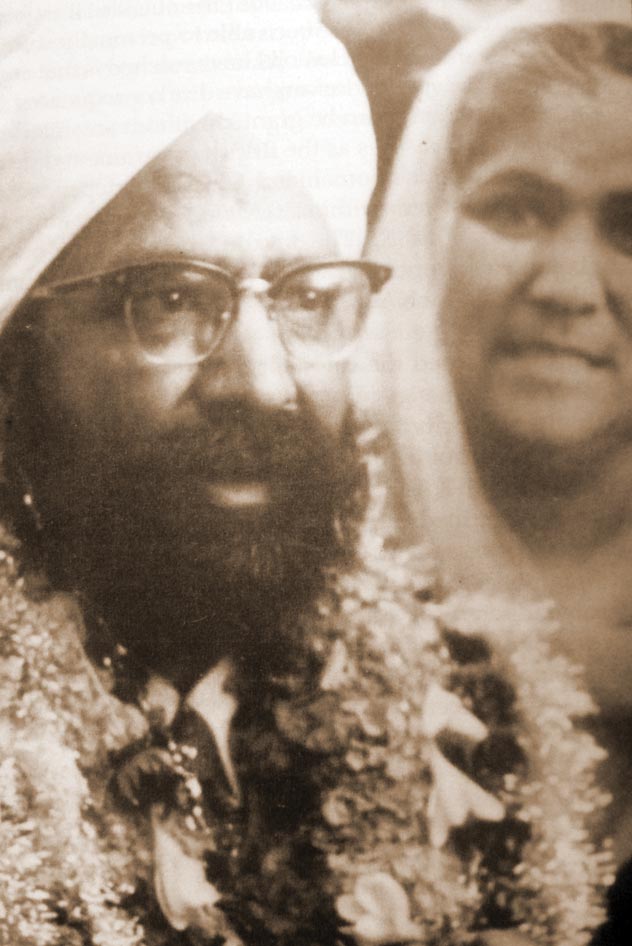
(Above): Makhan Singh with sister Kulwant Kaur. A patriot whose love transcended geographic boundaries, he was a pioneer in the labor movement in Kenya.
Among all famous Indians who migrated from India to make some other country their home Makhan Singh is unique. Most Indians were satisfied to improve their lot financially and kept a low profile so they would not rock the boat. Those who became conscious of their miserable position in their adopted home tried to fight for their rights as Indians, as Mahatma Gandhi during did his stay in South Africa. A great number of them who felt that their destitute situation was caused by their colonial status in India organized themselves to fight for India’s freedom. Gadar Party organized in the U.S. in 1913 was such a glorious movement.
Among the galaxy of these heroic people Makhan Singh stands alone, who fought not only for India’s freedom when he was in India and was imprisoned for his activities there in 1939-1943, but also for the freedom of his adopted home, Kenya. He was among a select pantheon of Indian immigrants who not only made Africa their home, but who fought for their adopted homeland’s freedom wholeheartedly and sacrificed everything to achieve that goal without ever asking any rewards for their sacrifices.
Makhan Singh was born in a small village Gharjak , near Gujranwala in Punjab (now in Pakistan) in a Ramgarhia family. His ancestors worked as carpenters and blacksmiths. His father Sudh Singh Jabbal (born in 1893) lost his parents and brothers and grandmother in an epidemic of plague in 1903 and he tried to survive doing all kinds of jobs here and there until he sailed for Kenya in search of a better living. He made Kenya his home and brought his wife Isherkaur and children to Kenya in 1927. Makhan Singh (born on December 27, 1913) was 14 at this time. He attended what is now Jamhuri High School there, from which he graduated in 1933. He wanted to go abroad for further studies, but financial hardship crushed his dreams. His father owned a printing press at that time and he began to work there.
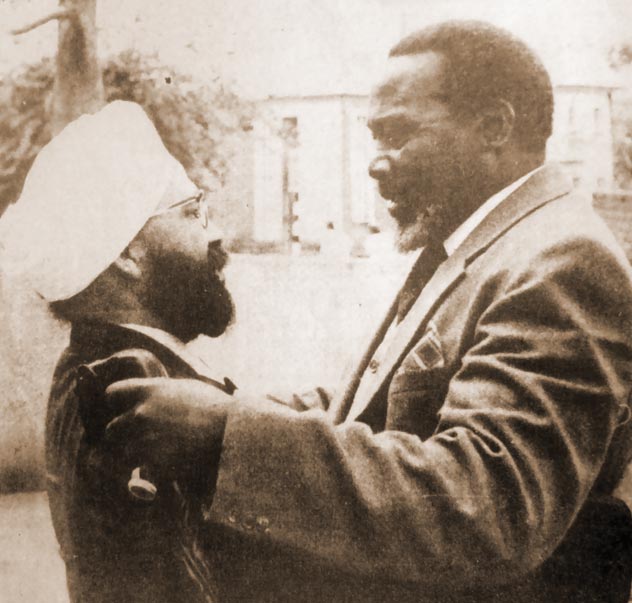 (Cover and above): Kenyan freedom fighter and labor movement pioneer Makhan Singh (l) with Kenyan independence leader Jomo Kenyatta. (Cover and above): Kenyan freedom fighter and labor movement pioneer Makhan Singh (l) with Kenyan independence leader Jomo Kenyatta.
Makhan Singh was influenced by the spirit of sacrifice of Sikhism in his childhood. In Kenya he came into contact of several Gadar Party members who were either living in East Africa or were visiting there on their way from or to India. Their dedication deeply influenced him .Their message, “Where you live you should fight for the freedom of that country,” made a great impression on his young mind. However, he was more concerned at that time with the problems of workers which remained his lifelong passion.
He got involved with the labor movement and was appointed the secretary of Indian Labor Union at the age of 22. However, Makhan Singh believed that workers should not be divided by ethnicities, as the problems of all workers are the same, no matter which color, creed or region they belonged to, so it was decided to organize the trade union on national basis. Thus the Labor Trade Union of Kenya was born, which later expanded to include Tanganyika and Uganda and was renamed Labor Trade Union of East Africa on April 23, 1935 This union appealed to all Kenyan workers to unite and fight for eight hours a day work, decent wages, permanent jobs, reduced school fees and compensations for injuries sustained at work. Makhan Singh worked hard in the labor movement, organizing meetings, strikes and handling publicity. The handbills for their activities were printed in four languages — English, Gujarati, Panjabi and Urdu — to unite the Asians and Africans.
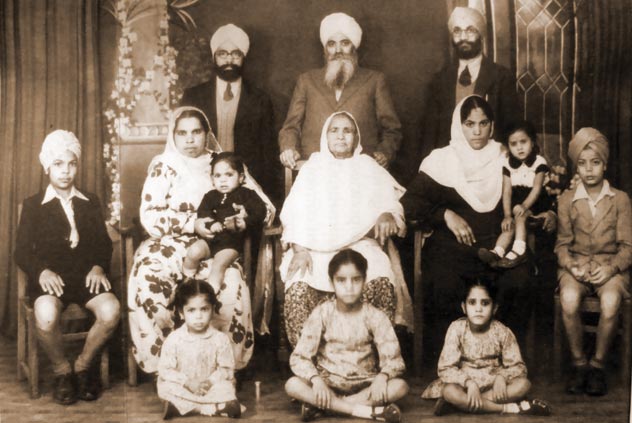 (Above): A family portrait in 1949. Standing (l-r): Makhan Singh, Sudh Singh and Shivcharan Singh. Sitting (l-r): Hindpal Singh, Satwant Kaur with Swarajpaul, Isher Kaur, Kulwant Kaur with Amrit, Gurdev. Front row (l-r): Inderjeet, Surinder, Tarlochan. (Above): A family portrait in 1949. Standing (l-r): Makhan Singh, Sudh Singh and Shivcharan Singh. Sitting (l-r): Hindpal Singh, Satwant Kaur with Swarajpaul, Isher Kaur, Kulwant Kaur with Amrit, Gurdev. Front row (l-r): Inderjeet, Surinder, Tarlochan.
On May 1, 1949 again he along with African leader Fred Kubai, founded the East African Trade Union. Fred Kubai was its first president.
In June 1939 Makhan Singh requested the Labor Trade Union of East Africa for leave to visit India. In his absence union activities lapsed. As a former president of LTUEA, Mota Singh, was detained in India in 1939 for his involvement in the labor and communist movement, Makhan Singh was advised to be cautious . But his spirit could not hold him back from participating in a celebration on January 26, 1940 which was designated as Independence Day. There he met many comrades from the Communist Party and he was assigned to work in Ahmedabad where he organized textiles union workers. He participated in May Day celebrations for which he was detained May 8 and kept in prison for the next five years. He was continuously moved from prison to prison. Meanwhile he had become a member of the Communist Party and began translating Marx’s Das Kapital in Punjabi while in prison. His grasp – on Marxism as well as on Punjabi — left a great impression on his comrades, which included Jagjit Singh Anand, editor of the Jung-e-Azadi, a Communist Party newspaper. Later on Makhan Singh worked on the editorial board of the same paper. He was also working closely with Kisan Sabha, mobilizing peasants.
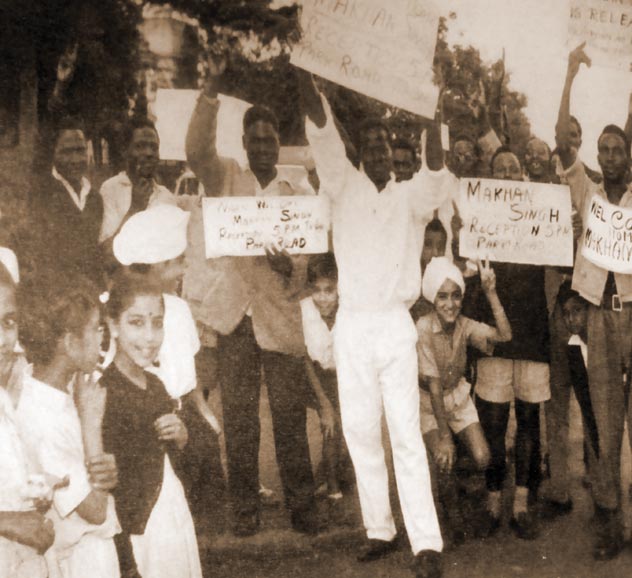 (Above): A joyous crowd with placards welcoming Makhan Singh, underscoring his multiracial appeal. (Above): A joyous crowd with placards welcoming Makhan Singh, underscoring his multiracial appeal.
After participating in India’s freedom movement for eight years, of which five were spent in prison, Makhan Singh left for Kenya on August 6, arriving in Nairobi on August 22. He celebrated India’s Independence Day on the ship. Soon after his arrival he was declared “a prohibited immigrant” on August 27 and ordered to leave Kenya within a month. After a lengthy court battle, Makhan Singh was allowed to remain in Kenya. Again he got busy reviving the Labor Trade Union. He also organized a Marxist study group. Indians at this time were divided in religious and other kind of sectarian groups. He tried to unite them and inspire them to be part and parcel of the nation by holding a ten-day fast. He reminded them that destiny of all Kenyans is the same.
As is described above, he and Fred Kubai founded East African Trade Union Congress, which became a central organization of trade unions. This organization mounted a rigorous campaign attacking the white oligarchy. In the first four months of 1950 it sponsored about thirty meetings.
Then came the historic day of April 23, 1950. A huge meeting was held in Nairobi’ Kaloleni Social Hall jointly by KAU — the main Kenyan freedom fighter organization — and East African Indian National Congress. A motion condemning the aggressive and racist agitation by the European settlers against granting equal representation to non-Europeans in Tanganyika’s legislative assembly was moved. Makhan Singh moved an amendment to the resolution declaring that nothing less than complete independence and sovereignty of East Africa and establishment of democratic government elected by the people is the real solution to the problem. Thus, Makhan Singh became the first Kenyan demanding Uhuru Sas – freedom now. Two weeks later Makhan Singh and his comrade Fred Kubai were arrested at 6:30 in the morning on May 15, 1950.
After a kangaroo court trial Makhan Singh was taken to Lokituang, “a desolate, hilly and volcanic (place) with lava deposits” — a hell on earth, where you sweat from morning to evening. A place of sand storms and unbearable heat, a place without electricity and piped water. There he was to remain for the next ten years — longer than any other Kenyan freedom fighter. He was in jail before Kenyatta and other key freedom fighters were arrested and he was in jail after they were released. There he remained when his mother died, and he was not given permission to attend her funeral.
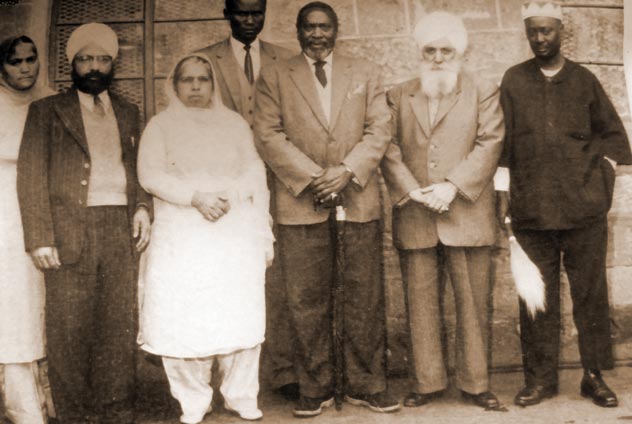 (Above): Family and friends (l-r): Kulwant Kaur, Makhan Singh, Satwant Kaur, Achieng Oteno, Jomo Kenyatta, Sudh Singh and Jaramogi Oginga Odinga. (Above): Family and friends (l-r): Kulwant Kaur, Makhan Singh, Satwant Kaur, Achieng Oteno, Jomo Kenyatta, Sudh Singh and Jaramogi Oginga Odinga.
Makhan Singh was again and again told that that he could be released from the prison if he agreed to leave the country forever. And he could have easily done so. He had friendly relations with India’s first Prime Minister Jawaharlal Nehru and many comrades in the Communist Party in India. But Kenya was his country and he was not going to betray it. He wrote to the governor, “You are trying to achieve the impossible. No trade unionist or political worker worth his salt would ever take the suicidal course of deportation to get his freedom. “
Again and again he was also advised to soften his declaration about being a devout communist. But he did not budge. “I am a communist. I am fighting for the freedom of all countries in the world.” And yet he at same time declared, “We communists did not believe in individual terrorism.” In fact as one of his friends said, he had a strong Gandhian streak in him with an abiding faith in non-violent methods and mass movements. He was a stickler for legality and honesty.
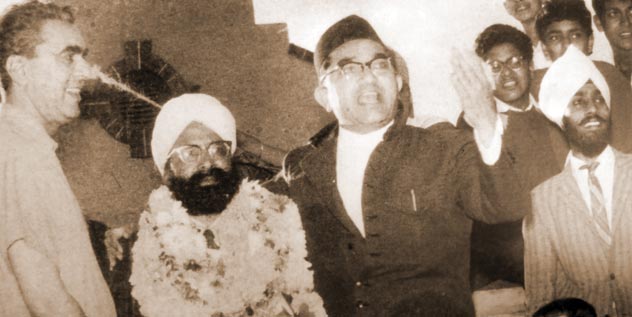 (Above): Political comrades in arms (l-r): Haroon Ahmed, Makhan Singh, K.P. Shah. (Above): Political comrades in arms (l-r): Haroon Ahmed, Makhan Singh, K.P. Shah.
Freedom to Kenya came in 1963. Or did it? Was it anything more than the change of the color of the flag flying over government building, a new type of colonialism? The leaders who became the rulers of new Kenya were so self-centered that they forgot their comrades who sacrificed everything to achieve this freedom. Makhan Singh, who inspired the masses, who was a great organizer, who could never provide his family anything but glory and pride, was sidelined, became a man in shadow. Yes, the common people kept coming to his home, even after he died in 1973, to support his widow, bringing her presents of food, but the government remained aloof to his devotion and sacrifice. On his death not many leaders came to pay tributes. He remained now unsung hero, even though the masses called him Mungu — the god. The man who broke all barriers and became a universal man remained neglected by all but a small circle of friends. All because he was too honest, too humble and too self-effacing. He only knew how to sacrifice. He was jailed by the British to keep his voice silent and killed by the neglect after Kenya’s freedom by the new rulers.
Further reading: “Unquiet: The Life and Times of Makhan Singh” (Zand Graphics, Nairobi 2006) is a well-documented and thoroughly searched biography of Makhan Singh written by Kenyan human rights activist scholar Zarina Patel.
|
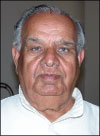 Poet folklorist Ved Prakash Vatuk’s many awards include the U.P. government’s Pravasi Bharatiya Hindi Sahitya Bhushan. “Essays in Indian Folk Traditions,” his collected writings, has just been published by the Folklore Institute, Berkeley, Calif. Poet folklorist Ved Prakash Vatuk’s many awards include the U.P. government’s Pravasi Bharatiya Hindi Sahitya Bhushan. “Essays in Indian Folk Traditions,” his collected writings, has just been published by the Folklore Institute, Berkeley, Calif.
|
|
|
|
|
|